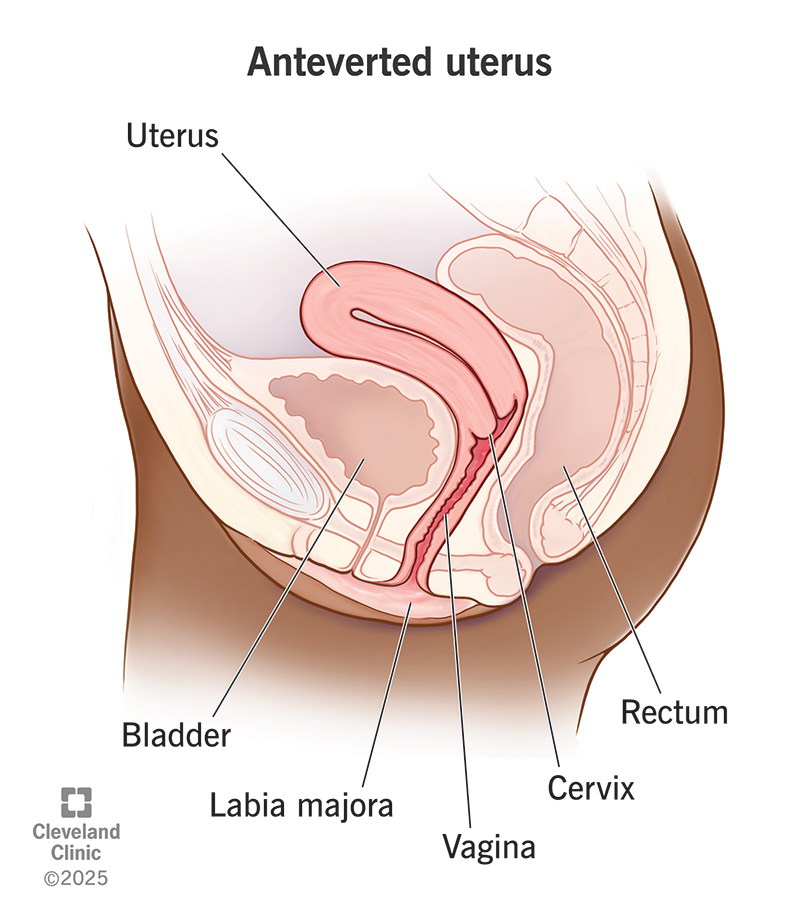An anteverted uterus describes the position of your uterus within your pelvis. When you have an anteverted uterus, it tilts forward. It’s a typical position for your uterus to be in and doesn’t cause any health concerns.
Advertisement
Cleveland Clinic is a non-profit academic medical center. Advertising on our site helps support our mission. We do not endorse non-Cleveland Clinic products or services. Policy

Image content: This image is available to view online.
View image online (https://my.clevelandclinic.org/-/scassets/images/org/health/articles/22569-anteverted-uterus)
An anteverted uterus is a uterus that tilts or leans forward. Most women are born with their uterus in this position. The opposite of an anteverted uterus is a retroverted uterus, which tilts backward.
Advertisement
Cleveland Clinic is a non-profit academic medical center. Advertising on our site helps support our mission. We do not endorse non-Cleveland Clinic products or services. Policy
An anteverted uterus usually doesn’t cause symptoms. It simply describes how your uterus sits in your pelvis. You likely won’t even know your uterus is anteverted.
In some cases, an anteverted uterus can have a severe forward tilt. This can put pressure on your pelvis and cause pain during sex or menstruation.
A retroverted uterus tilts backward and is more likely to cause painful symptoms.
You’re usually born with your uterus tilted forward. If you’re born with a retroverted uterus, there’s a chance it may shift to an anteverted position during pregnancy. Scar tissue from surgery or conditions like endometriosis can also cause a retroverted uterus to change to an anteverted uterus.
A healthcare provider can find the position of your uterus by doing a pelvic exam. A transvaginal ultrasound can also show which way your uterus tilts.
There aren’t any health risks of an anteverted uterus. It shouldn’t cause you any pain or affect pregnancy or childbirth in any way.
As there aren’t any health concerns related to an anteverted uterus, there’s nothing specific to discuss with a healthcare provider about it. Contact a provider if you have any of the following:
Advertisement
You can keep your uterus healthy by having routine pelvic exams and Pap tests.
Possibly. Many factors go into how soon you appear pregnant to others. The position of your uterus may be one of these factors.
Having an anteverted uterus isn’t good or bad. It just describes the way your uterus tilts within your pelvis. It’s completely normal if your provider says your uterus is anteverted, or tilted forward. If you have any concerns about having an anteverted uterus, talk to your healthcare provider.
Advertisement

Sign up for our Health Essentials emails for expert guidance on nutrition, fitness, sleep, skin care and more.
Learn more about the Health Library and our editorial process.
Cleveland Clinic’s health articles are based on evidence-backed information and review by medical professionals to ensure accuracy, reliability and up-to-date clinical standards.
Cleveland Clinic’s health articles are based on evidence-backed information and review by medical professionals to ensure accuracy, reliability and up-to-date clinical standards.
From routine pelvic exams to high-risk pregnancies, Cleveland Clinic’s Ob/Gyns are here for you at any point in life.
